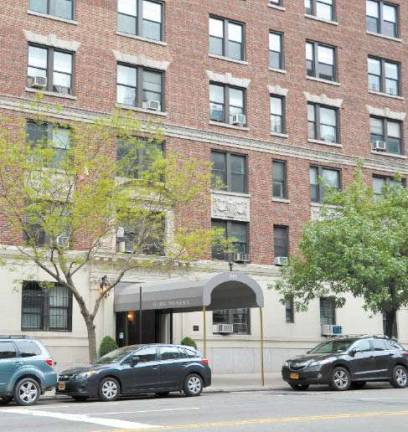Not-So-Affordable Housing

Tenants say a city agency is unfairly allowing landlords to overcharge Section 8 tenants in Hell's Kitchen
Hell's Kitchen Residents of affordable housing usually are charged a set portion of their income for rent; it's what ensures that the units retain their affordability, regardless of inflation.
Section 8 tenants in Hell's Kitchen said they've been paying well above 30 percent of their yearly income for housing since 2003, in an apparent contradiction of what they were told when their building was bought that year by a private company called Empire State Management.
"In 2003, we were told that our rent would be 30 percent of our annual income by both a [NYC Dept. of Housing Preservation and Development] representative and the landlord," said Kelly Ann Junior, a Section 8 enhanced voucher tenant of Hudsonview Terrace, a 400-unit tower at 747 10th Avenue.
Junior and four others were Section 8 tenants when their Mitchell-Lama building changed hands and Empire began filling it with market-rate tenants. Section 8 tenants were given a choice to retain their regular Section 8 status and find a different subsidized apartment elsewhere in the city, or stay in their apartments under Section 8's enhanced voucher program.
Enhanced vouchers, also known as sticky vouchers, are specifically designed to protect tenants of rent-regulated apartments when their buildings end a subsidized program like Mitchell-Lama. Enhanced voucher holders are still subject to rent increases under a formula determined by the federal Dept. of Housing and Urban Development that calculates a tenant's share of the rent and the share paid by the government as part of the subsidy.
Junior and other tenants of Hudsonview Terrace chose to participate in the enhanced voucher program, and as a result, they said, have been paying steadily increasing rents after a series of "re-certifications" by their landlords, which were subsequently approved by HPD.
Now those tenants have filed a lawsuit to address what they see is an unfair discrepancy. According to the suit, one tenant who lives in a one-bedroom apartment and makes $9,000 a year in Social Security is paying over $400 a month, over half her yearly income, in rent.
In the legal complaint, the tenants' attorney, Robert Katz, alleges that his clients' right to due process was violated because they were not granted evidentiary hearings as their rents were being raised. The suit also says that Junior and the other tenants were not adequately made aware by HPD that their rents could increase under the enhanced voucher program.
The lawsuit may not go anywhere; an earlier version that named the U.S. Dept. of Housing and Urban Development as a defendant was dismissed in 2011 by a federal judge. In that ruling, Judge Paul Crotty said Katz's argument was not sufficient to demonstrate his clients' right to due process was violated.
But the suit does raise the question of whether the guidelines under the enhanced voucher program are vulnerable to exploitation. It also asks if HPD could do a better job letting Section 8 tenants know about their options and the possible rent increases they could face.